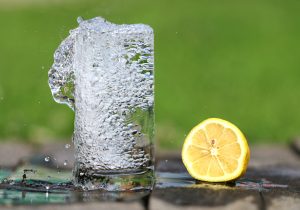 You may have heard the phrase “You are what you eat”, yet rarely does anyone say “You are what you drink”. It’s a very accurate statement as you are composed of 60% to 70% water. Water is second only to air in importance for life. Water is an essential cornerstone of Wellness. Drink up!
You may have heard the phrase “You are what you eat”, yet rarely does anyone say “You are what you drink”. It’s a very accurate statement as you are composed of 60% to 70% water. Water is second only to air in importance for life. Water is an essential cornerstone of Wellness. Drink up!
The Importance of Drinking Water
Drinking water, either plain or in the form of other fluids or foods is essential to your health. Your body depends on water to survive. Every cell, tissue, and organ in your body needs water to work properly. Your body uses water to maintain its temperature, remove waste, protect your brain, improve digestion, increase metabolism, rejuvenate the skin and lubricate your joints. Water is needed for overall good health and is the single most important nutrient for our bodies.
If you don’t maintain a steady supply of water to your organs, tissues and cells, they cannot perform correctly and this can lead to
illness and disease. Starting your day with water gives your body the hydration it needs after resting from the night before. Sleep is the time of renewal for our body, so by starting off the day with water helps our body work more effectively.
Most individuals lose between 10 and 16 cups of water per day through sweat, urine, digestive waste, exhaling and direct evaporation from your skin. The loss of water through urination can be greatly increased by drinking caffeinated and alcoholic beverages. These drinks have a diuretic effect by stimulating the kidneys. You then lose more water and vitamins, calcium, magnesium, potassium, sodium, chloride and zinc.
Water has successfully helped many diagnosed diseases, e.g., peptic ulcers, colitis, hypertension, rheumatoid arthritis, chronic back and neck pain, anxiety, depression, chronic fatigue, high cholesterol, asthma, allergies and diabetes, with just increased and regular intake of water.
Path to Improved Wellness
You should drink water every day. Over the years, you have been told you should drink 6 to 8, 8-ounce glasses of water each day. That is a reasonable goal. However, different people need different amounts of water to stay hydrated. Most healthy people can stay well hydrated by drinking water and other fluids whenever they feel thirsty. A good rule of thumb for those who do want to measure water intake, is to divide your weight (pounds) in half and drink that number of ounces each day. For example, if you weigh 200 pounds you should drink 100 ounces of water per day. Water is best for staying hydrated. Other drinks and foods can help you stay hydrated. Eating water-rich foods add to the amount of water you get each day. Even caffeinated drinks, coffee, tea, and soda can contribute to your daily water intake however, it’s best to limit caffeinated drinks as it may cause you to urinate more frequently.
Sports drinks can be helpful if you are planning on exercising at higher than normal levels for more than an hour. It contains carbohydrates and electrolytes that can increase your energy and helps your body absorb water. However, some sports drinks are high in calories from added sugar and may contain high levels of sodium (salt). Energy drinks are not the same as sports drinks. Energy drinks usually contain large amounts of caffeine, sugar and contain ingredients that overstimulate you (guarana, ginseng, or taurine). These are things your body doesn’t need…
Some of the Reasons for Dehydration
Even though you know you need to drink plenty of water per day you may not consider situations when you will need more water than usual. People who engage in outdoor physical labor during the summer tend to lose two to three liters of water due to perspiration throughout the workday. It’s also important to note that both children and older adults are more prone to dehydration than healthy teens and adults. People with certain chronic health conditions, such as diabetes, kidney disease, and congestive heart failure are also at risk of dehydration. Older adults often don’t get enough fluids and risk becoming dehydrated, especially during summer when it’s hotter and they perspire more. Older people don’t sense thirst as much as they did when they were younger and that could be a problem if they’re on a medication that may cause fluid loss, such as a diuretic. Which is why it is best to discuss the amount of ounces of water needed per day with the prescribing physician.
How to Stay Hydrated
The best way to ensure you stay hydrated is to make water the beverage you drink most often. While excessive consumption is possible, it is very difficult to drink too much water. By making sure you stay hydrated, you’ll feel sharper, perform better, have more energy, get more done, and give your body what it needs to help ensure better health. Not sure on just how much you need? keep a daily log of food and drink intake, makes notes on how you feel on each of these days. This way your log is available the next time you meet with your family physician.

